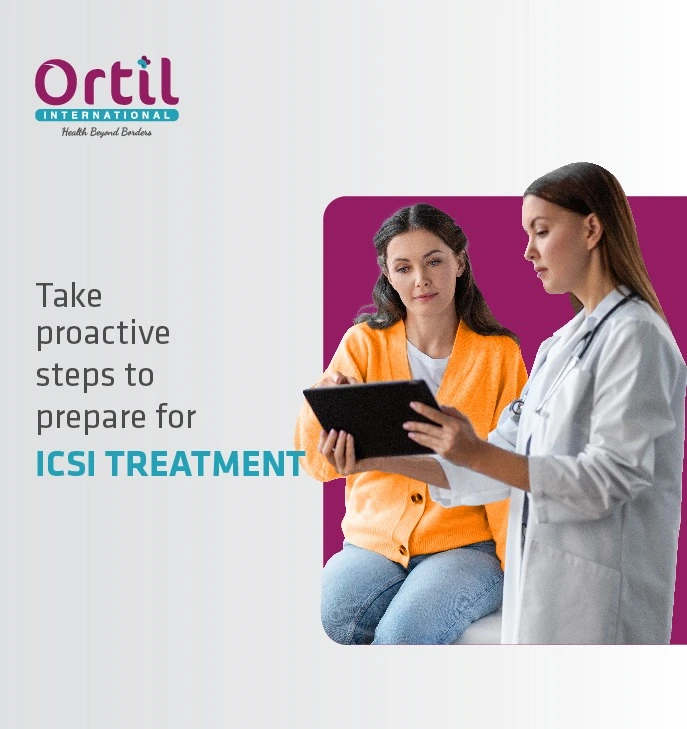How to Prepare for ICSI Treatment?
Preparation for ICSI involves many steps, and each step is essential to the success of the procedure. However, every patient is unique and may need individualized treatment to improve the chances of success. Let’s discuss some of the general steps involved in the ICSI preparation.
- Get a Consultation
- Diagnostic Tests
- Learn About ICSI
- Change Your Lifestyle
- Take Medication if Needed
- Get Support

Intracytoplasmic Sperm Injection, or ICSI, is a reproductive assistive technology in which the sperm is directly injected into the egg to allow fertilization. It is used in the process of IVF when the cause of infertility is from the male partner.
ICSI requirements are beneficial for those patients suffering from male infertility, such as low sperm count or motility. Some patients store their gametes for future use, and they are also used to preserve the fertility of patients.
Steps for ICSI Treatment Procedure
After the initial consultation and evaluation tests, the procedure of ICSI starts, and it may involve the following steps:
Stimulating the Ovaries : Your fertility specialist will give you hormonal medications to stimulate egg production in the ovaries. A quality egg is necessary for ICSI.
Retrieval of Eggs : When your eggs are ready, the doctors perform a minor surgery to obtain quality eggs. The eggs are retrieved and stored for the upcoming steps involved in the procedure.
Fertilizing the Eggs : After determining the high-quality eggs, the sperm cells are injected directly into the egg cells in a lab for fertilization. This is usually required in cases of low sperm count and motility.
Monitoring of Embryos : The lab technician monitors the fertilized egg or embryo to see its growth progress and to determine which embryos are of the highest quality and healthiest quality to use in the transfer process.
Embryo Implantation : After a few days, the healthiest embryo is selected and transferred to the uterus of the female partner. This simple task does not require anesthesia. After the embryo is transferred, a pregnancy test is performed after a week to check the success of the ICSI procedure.
Benefits of ICSI Treatment
ICSI treatment is a type of IVF procedure that is used widely, especially in cases where pregnancy does not occur due to male infertility. When the sperm count is low, or there is limited motility of sperm, or the male partner has to go for aggressive treatments, the process of ICSI can be beneficial for such cases. Some of the benefits associated with ICSI treatment are as follows:
- Increased fertilization rates
- Treatment for male factor infertility
- Higher success rates in cases of low sperm count
- Overcoming sperm motility issues
- Reduced risk of failed fertilization
- Treatment for abnormal sperm morphology
- Option for couples with previous IVF failures
- Ability to use frozen sperm samples
- Minimal risk of genetic abnormalities
- Enhanced embryo selection
- Treatment for obstructive azoospermia
- Suitable for couples with unexplained infertility
- Lower risk of DNA fragmentation in sperm
- Higher chances of successful pregnancy
- Option for couples with ejaculatory dysfunction
- Lower risk of miscarriage
- Ability to select the healthiest sperm
- Potential for improved embryo development
How to Prepare for ICSI Treatment?
You should prepare yourself for ICSI treatment by taking the following steps:
Get a Consultation : First, meet with your fertility specialist to determine the cause. They'll examine both partners to determine what to do next, such as trying ICSI.
Diagnostic Tests : Your healthcare professional might suggest some evaluation tests to plan the treatment according to their results. It is essential to maximize the chances of treatment.
Learn About ICSI : Learn about ICSI, including what happens during the procedure, how likely it is to work, and what problems could arise. This will help you make good choices and understand what might happen.
Change Your Lifestyle : Start taking steps to improve your health and chances of getting pregnant. Eat well, keep a healthy weight, quit smoking, cut back on alcohol, manage your stress, and exercise regularly.
Take Medication if Needed : If the doctor suggests it, take any medicine or hormones they recommend to prepare for ICSI. Follow their instructions carefully and tell them if you are worried about the side effects.
Get Support : Understand that dealing with infertility and treatments can be tough emotionally. Talk to friends, join support groups, or see a therapist if you need help to manage the stress.
Plan Your Finances : Determine the cost of ICSI, including all the appointments, tests, medications, and the number of cycles required.
What Happens After ICSI?
After ICSI, your doctor evaluates the fertilized egg in the lab to check if it is properly fertilized. After five to six days, a healthy fertilized egg should start dividing into cells and growing. Your doctor looks at the size and cell mass of the fertilized egg to decide the best time for the embryo transfer.
The embryo transfer usually happens on the fifth or sixth day after the egg is retrieved, but sometimes, due to the patient's condition, it's delayed for a month or even longer. Your doctor will talk to you about the right time for your embryo transfer.
The doctors carefully transfer the fertilized egg for implantation in the uterus. It is recommended to take a pregnancy test after a week or two to check the success of the procedure.
What are the do's and don'ts after ICSI?
ICSI procedure is generally safe, but there are some guidelines that your doctor may ask you to follow. Do’s and Don’ts after ICSI are as follows:
Do's
- You should rest after the transfer of the embryo.
- Try to eat healthy and maintain a healthy lifestyle.
- Take medications as prescribed by your doctor.
- Stay hydrated
- Manage your stress and anxiety levels by seeking support or professional help.
- Follow the doctor's instructions strictly.
Don'ts
- You should not perform strenuous exercise
- Avoid sexual intercourse for some time after the transfer of the embryo.
- Avoid taking baths in the swimming pool to avoid any chances of infection.
- Do not use home pregnancy tests, as it can give false hopes
- Do not miss the dose of your prescribed medications
- Do not adopt unhealthy habits like alcohol or smoking.
- Do not ignore the signs of discomfort or unusual symptoms.
Conclusion
ICSI preparation and planning require a proper understanding of the procedure, its benefits, side effects, and possible outcomes. ICSI requirements involve stimulating and retrieving eggs, fertilizing eggs with sperm, and embryo transfer. The success rates depend on each patient's condition, and some patients may require more than one cycle of ICSI.
FAQ's of ICSI Preparation
Is ICSI Safe?
ICSI is generally safe and can be a very effective method to conceive even after the failure of previous IVF cycles.
How Long Does the ICSI Procedure Take?
The ICSI procedure usually involves sperm and egg collection and may take 4 to 6 weeks to prepare the patient and to perform the complete ICSI procedure.
How Long Does Recovering from an ICSI Procedure Take?
Recovering from an ICSI procedure typically takes a few days to a week. Most people can return to normal activities within a week after the procedure. However, it is essential to consult with healthcare professionals.
How Many Eggs are Needed for ICSI?
A single egg is used in each ICSI cycle, but doctors generally take 7 to 8 mature egg cells for the procedure.
How Can I Increase My Chances of Successful ICSI?
To increase your chances of success with the ICSI procedure, take medications, maintain a healthy lifestyle, manage your stress, and follow your doctor's instructions.


























